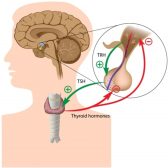Definition
noun:
(taxonomy) A family of gram-negative bacilli that inhabit the large intestine of humans and other mammals
Supplement
The family Enterobacteriaceae includes gram-negative bacilli and belongs to Class Gammaproteobacteria. Members of the family Enterobacteriaceae are mostly nonpathogenic and present in the lower part of the intestine of their human and other mammalian hosts as commensals and symbionts. They are part of the normal gut flora, providing by synthesizing vitamin K, which the hosts are unable to synthesize on their own. Nevertheless, some of them may become opportunists or pathogenic, causing diseases such as gastroenteritis, urinary tract infections, etc.
They are typically 1-5 μm in length. They lack cytochrome C oxidase, except for Plesiomonas shigelloides. They are facultative anaerobes, fermenting sugars to produce lactic acid. Most of them reduce nitrate to nitrite; an exception to this is Photorhabdus species. Many of them have flagella as their locomotory organ. On blood agar, they appear as small grey colonies. They are non-spore-forming.
Enterobacteriaceae includes the following genera:
- Citrobacter
- Cronobacter
- Enterobacter
- Escherichia, e.g. E. coli
- Hafnia
- Klebsiella
- Pantoea
- Plesiomonas
- Proteus
- Raoultella
- Salmonella
- Serratia
- Shigella
Word origin: Greek énteron (intestine)
Scientific classification:
- Domain: Bacteria
- Phylum: Proteobacteria
- Class: Gammaproteobacteria
- Family: Enterobacteriaceae
Other common name(s):
See also:







